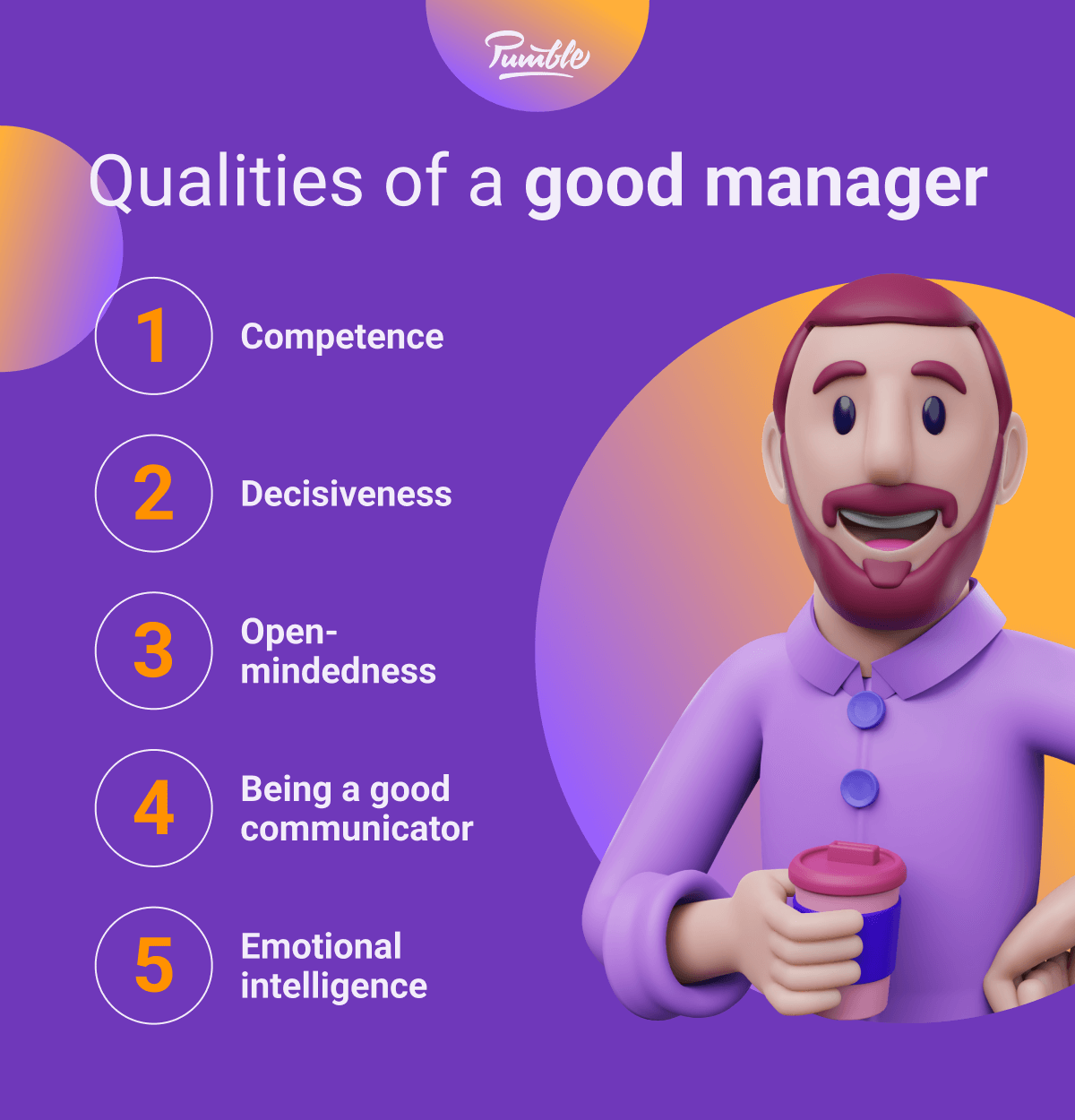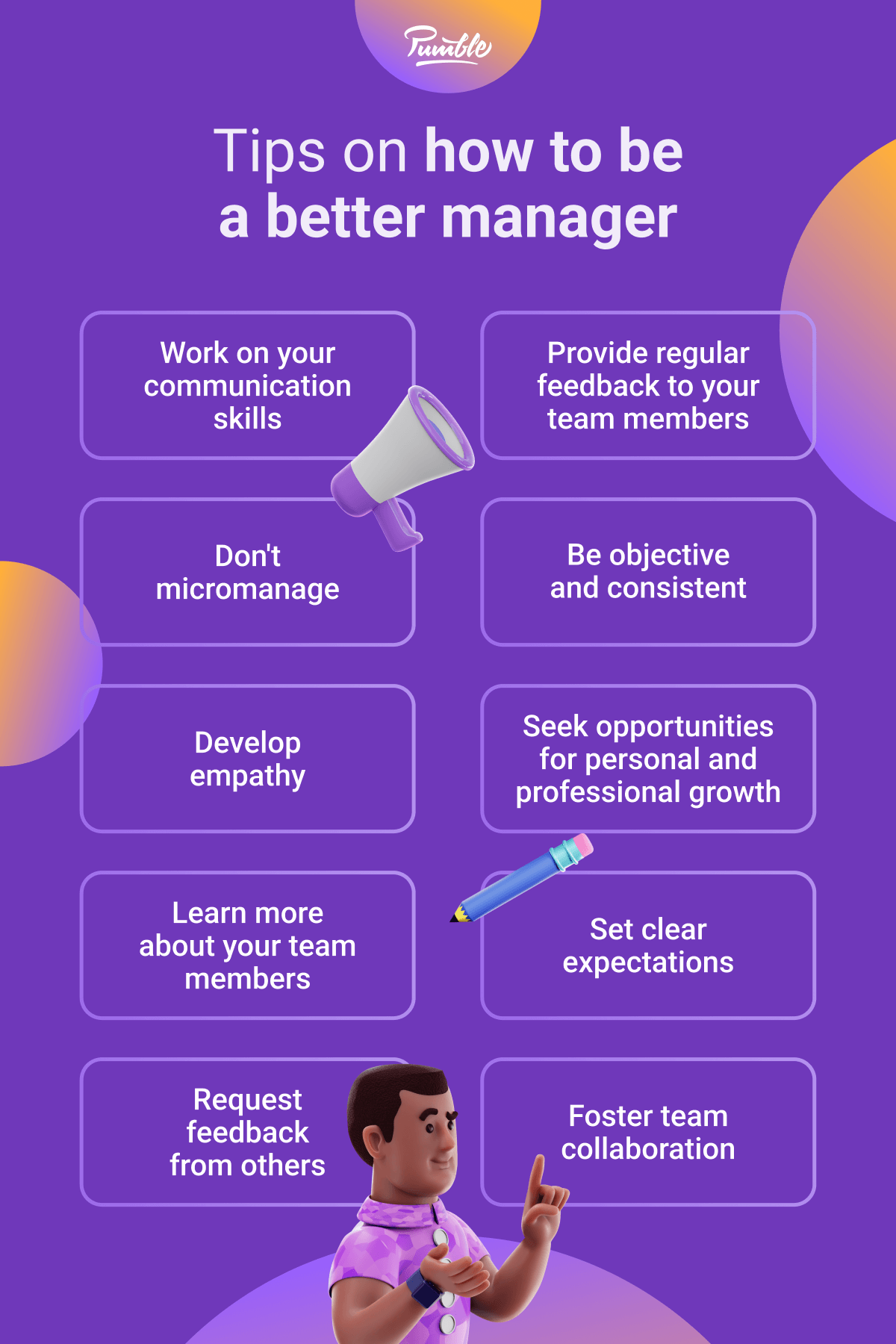What makes a good manager?
Do you have to be an authoritative stickler for discipline? Or should you aim to be as friendly and kind to your employees as possible?
Since these questions have been up for discussion for years, we have decided to get concrete answers and help you improve your management skills.
Hence, in this article, you will find the answers to the following questions:
- What makes a good manager?
- What are the things managers can do better?
- How do you become a good manager and leader?
- How can good management skills lead to personal and company success?
Let’s find out how to be a good manager, without further ado.

What are the qualities of a good manager?
A good manager empowers their team to make better results but doesn’t micromanage their work.
However, to be able to do that, a manager needs to possess certain qualities.
To help you learn how to be a good manager, we have compiled a list of characteristics of a successful manager:
- Competence
- Decisiveness
- Open-mindedness
- Being a good communicator
- Emotional intelligence
Let’s see why these qualities are so important.

Quality #1: Competence
Managers should never stop learning.
What’s more, they should always revise what they have learned because the authority that comes from competence is long-standing.
A former CEO at YMCA and Founder of Rand Consulting and the Boss Lady Community, Teresa Rand, confirms that competence ensures long-lasting benefits:

“Leadership involves setting a positive example through integrity and accountability, inspiring trust, and respect. A manager should be skilled at delegation to empower their team while maintaining a sense of responsibility.”
Once an employee is assured that their manager’s decisions are corroborated by their extensive knowledge or experience in a specific area, they will not question their authority.
Instead, they will know that all the corrections or advice they get from their manager are justified. Hence, the positive atmosphere in the team will not be disturbed.
Furthermore, employees will ask for help and advice more frequently because they trust their manager and want to learn more.
Consequently, the whole team will achieve better results, which is one of the goals of effective management.
💡 Pumble Pro Tip
By sharing the knowledge with your colleagues and employees, you foster team collaboration.
To learn more about key elements of team collaboration, check out the following article:
Communicate and collaborate effectively in Pumble
Quality #2: Decisiveness
Could you imagine Michael Jordan being indecisive about which path the famous Bulls team should take?
Neither can we!
The manager should be the team’s leader. Hence, they should always know where their team goes and what the main goals are.
A manager’s determination to reach the main targets can often motivate team members to work even harder.
That is exactly what Dunja Jovanovic, a Content Manager at Pumble — a team collaboration app by CAKE.com — pinpoints as one of the most important attributes of a good manager:

”Good managers don’t just tell their team members what to do and how to do it — they motivate them to do their best and find purpose in their work.”
The founder and CEO of Folderly, Vladislav Podolyako, agrees that one of the crucial traits of a good manager is decisiveness:

“Any good manager should make decisions and stick to them, no matter how hard.”
Will every decision be easy? Absolutely not!
There will be a plethora of them that will cause you sleepless nights.
However, you should persist in carrying them out as long as your decisions are:
- Beneficial for the team and company,
- Objective, and
- Based on knowledge and careful research.
Quality #3: Open-mindedness
The common mistake managers can make is to think that adopting someone’s advice endangers their authority.
That is anything but the truth.
Although they don’t always need to apply everything they hear, managers should always listen to others’ advice.
Being open-minded to other opinions will:
- Broaden their perspective,
- Inspire them,
- Help them grow, and
- Improve team collaboration.
A retired DEA Supervisory Special Agent and Founder of Eagle 6 Training, Brian Townsend, confirms that humility and open-mindedness are characteristics of a good manager:

“Managers must approach their role with humility and a willingness to learn. It is important to acknowledge that you don’t have all the answers and actively seek feedback and advice from others.”
He also adds that a broad-minded manager can inspire their team:

“By embracing a growth mindset, a good manager inspires their team to embrace learning opportunities and continuously improve.”
Yes, the manager should be the one who makes final decisions, but with an inspired team at their disposal, they would have plenty of people willing to contribute to making those decisions even better.
Vladislav Podolyako, a successful CEO, also believes that thinking out of the box and openness to other perspectives are qualities of a great manager:

“Any good manager has to be adaptable, flexible, and oriented to their environment. They should:
- Always look for new opportunities,
- Be open to new ideas,
- Listen to what other people in the organization say, and
- Be willing to take risks.”
Finally, Podolyako pinpoints the main benefits of being open to other opinions and learning from others:

“Only through learning can they become better and advance their profession.”
Become better and advance in what we do — don’t we all want that?
💡 Pumble Pro Tip
As a manager, you must create an atmosphere where your colleagues are encouraged to share their opinions with you and contribute to decision-making processes.
To do so, you have to lay the foundations of a tolerant and inclusive environment.
To help you create such an environment, we have created the following article:
Quality #4: Being a good communicator
You cannot expect your colleagues or employees to achieve good results if they don’t understand exactly what they need to do.
Hence, being able to communicate expectations clearly is one of the most cherished attributes of a good manager.
According to Teresa Rand, strong communication skills are the key characteristics of a successful manager:

“Managers must convey their vision clearly, actively listen to their team, and foster a culture of open dialogue.”
A Content Manager at Plaky, Andjela Vidojevic, agrees that being a good communicator and nurturing a culture of open dialogue makes things easier in the workplace:

“I believe that, first and foremost, managers need to be all-around good communicators. If communication is clear, transparent, and genuinely encouraged from all sides, it’s much easier to get things done and make everyone feel a valued part of the team.”
When you present tasks to your colleagues and talk them through every step they need to take, there are greater chances to get things done without any problems.
If necessary, schedule a 1-on-1 meeting with team members and explain to them (in detail) what they need to do or improve in their work so far.
Host productive and engaging feedback sessions in Pumble
In case unexpected problems or internal crises appear, the precise additional instructions you provide calmly and clearly might help your team complete the task.
Once your team finishes a demanding task or achieves good results, Podolyako advises you not to forget the feedback:

“Managers are also expected to provide feedback and can only do so with good communication skills.”
By providing regular feedback, you establish stronger bonds with your team members and help them grow as professionals.
💡 Pumble Pro Tip
To learn how to improve your communication skills, check out the following article:
Quality #5: Emotional intelligence
Times of mini dictators in management have passed.
No matter how skilled someone is, they won’t go far in the race for a management position without understanding others’ needs.
On the other hand, skilled professionals with high emotional intelligence have higher chances of being good managers.
Vidojevic claims that emotional intelligence can lead to various benefits:

“Good managers possess emotional intelligence, which allows them to:
- Better understand and support their team members,
- Navigate through challenging situations,
- Diffuse conflict,
- Keep their own emotions in check, and much more.”
When you show that you care about your team members’ well-being, they will appreciate you even more.
For example, if you notice that the performance of one of your team members has deteriorated, try to understand the reasons that led to that situation.
Maybe they are tired, demotivated for some reason, or going through emotional turmoil.
Whatever it is, show that you care — try to help by giving them a few days off or providing any other assistance you think they need. Sometimes, even having a difficult conversation about the problems they’re facing might be useful.
Displaying emotional intelligence in the workplace by understanding team members’ feelings will preserve and further enhance psychological safety in the workplace.
According to Townsend, that is of paramount importance for a good manager:

”Managers must foster an inclusive team culture — a psychologically safe environment — where every member feels heard and valued, regardless of their role or abilities. This highlights the significance of building strong relationships within a team, as collective success often stems from a shared sense of purpose.”
10 Tips on how to be a better manager
People don’t quit companies, they quit their managers.
Managers, like everyone else, have their weaknesses — and that is fine!
However, if a manager is not self-aware and doesn’t work to eliminate those weaknesses, they might have to face negative consequences such as:
- Unhappy team members,
- Bad productivity, and
- Mass layoffs.
Most importantly, even managers themselves can be fired.
To help you avoid potential negative scenarios like that and be the best manager you can be, we have created a list of tips that will improve your management skills:
- Work on your communication skills,
- Provide regular feedback to your team members,
- Don’t micromanage,
- Be objective and consistent,
- Develop empathy,
- Seek opportunities for personal and professional growth,
- Learn more about your team members,
- Set clear expectations,
- Request feedback from others, and
- Foster team collaboration.
Let’s learn more about them.

Tip #1: Work on your communication skills
Nobody becomes a manager by a stroke of luck.
If you have been appointed as a manager, you most likely have certain professional skills that are in line with your upper management’s expectations.
To make full use of your technical expertise, your communication abilities have to be top-notch.
Jovanovic confirms that communication skills are paramount for every manager:

“A huge part of being a manager is working with people. That, believe it or not, doesn’t always come naturally, it actually requires certain skills. As you can probably guess, communication skills are the highest in the hierarchy.”
Vidojevic agrees with Jovanovic and adds:

”Constantly work on your communication skills:
- Practice active listening,
- Try to be as clear and transparent as possible,
- Encourage upward feedback,
- Be aware of your team members’ different communication styles, etc.
I cannot stress enough just how important communication is, especially in a remote work environment.”
The best way to practice communication is to constantly engage in conversations and meetings — not only as a silent observer but as an active participant.
Practice your communication skills in Pumble
To maximize your verbal and non-verbal communication skills you can do the following:
- Choose your words carefully,
- Prepare your speech before important meetings,
- Mind your tone,
- Become a good listener, and
- Pay attention to body language.
By doing the things above, you will rarely be in a dilemma about how to speak to people in higher positions and, for example, your team members.
💡 Pumble Pro Tip
To learn more about communication and communication types, check out the following article:
Tip #2: Provide regular feedback to your team members
Managers have to provide team members with regular and objective analysis of their performance to help them grow and improve.
However, our contributor, Brian Townsend, highlights that managers often neglect the importance of regular feedback:

”Managers don’t provide their people with enough feedback.
One of the easiest ways to be an effective manager is to provide regular feedback. Yet, one of the biggest complaints we continue to hear from employees is that they need to receive more of it.”
He also adds that providing continual feedback is crucial for effective management:

“Could you imagine a coach not providing feedback to their team? Or waiting until the end of the game or season to correct bad behavior? Of course not!
If you manage people, you are responsible for that. You are the coach. Good coaches and good leaders will continually provide feedback for both good and bad behavior.”
As Townsend says, it is essential to praise team members when they do something good. However, it’s also vital to know that giving negative feedback isn’t a bad thing.
On the contrary, it might motivate a professional to increase their engagement and enhance results.
Another positive aspect of regular feedback is building trust between you and the team.
Podolyako believes that providing regular feedback can nurture an atmosphere of trust that can make you a better manager:

”You build trust by being honest with your team and offering them specific advice. Among many benefits of trust, the main one is that your team will be open to sharing their challenges and more likely to give you feedback, making you a better manager.”
Tip #3: Don’t micromanage
Micromanagement is not one of the traits of effective managers.
In one of our previous Pumble blog articles, we defined micromanagement as a pattern of management behavior where a manager excessively oversees, controls, and observes the work of their employees.
To avoid micromanagement, just do the opposite of what is stated in the definition:
- Give clear instructions,
- Be open to any questions or possible modifications,
- Let the team members do their job,
- Focus on results, and
- Provide feedback.
Jovanovic agrees that managers can easily fall into the notorious micromanagement trap:

“Some managers tend to fall into the micromanagement trap, especially in a remote setting.
They know they are responsible for their team’s performance and feel the need to control every little thing.”
She adds that this can lead to various negative outcomes:

“Micromanagement doesn’t benefit either party — (micro)managers are overworked and team members are stressed and upset because of the lack of trust.”
But, is micromanagement warranted when we notice some of our team members aren’t as competent as we thought?
According to Jovanovic, micromanagement shouldn’t be one of the solutions even then:

“There are some instances where employees are not as competent as they appeared to be on the job interview, but for the most part, your team members are hired for a reason. They’re great at what they do — let them just do their job.”
Vidojevic has the same viewpoints as Jovanovic regarding micromanagement:

“Don’t micromanage. Make sure everyone’s on the same page about shared goals, support your team, but let them do their job and trust that they’ll do it well.”
Negative outcomes of micromanagement prove that the road to hell really is paved with good intentions.
So, don’t fall into the trap — follow the mentioned tips and let your team members grow.
💡 Pumble Pro Tip
If you want to learn more about micromanagement (not just the definition we mentioned above), we recommend checking out the following article:
Tip #4: Be objective and consistent
Being objective and consistent when making decisions, along with your competence and other skills, increases your authority and trustworthiness.
To prove to everyone that you are trustworthy, set criteria at the very beginning of your manager career and stick to them.
These criteria will help you whenever you have to:
- Make a decision
- Provide feedback, and
- Review one’s performance.
Of course, some of the criteria may change over time.
But, as long as you treat everyone equally and set clear expectations on time, there will be no problems.
However, if you are an inconsistent decision-maker, the team you lead might suffer negative consequences.
Rand agrees that is a real possibility when a manager has different criteria for their employees:

“Managers who make arbitrary or biased decisions erode trust and cohesion within the team.”
To avoid this, remain consistent and unbiased. It will help you go a long way in your career.
💡 Pumble Pro Tip
To learn more about biased decisions and their negative consequences, check out the following article:
Tip #5: Develop empathy
Empathy is one of the key elements of emotional intelligence that every manager must have.
According to the report The Power of Empathy in Times of Crisis and Beyond, there are many benefits of having an empathetic manager:
- 47% of employees with highly empathetic managers feel (often or always) innovative at work,
- 67% of employees with highly empathetic managers feel (often or always) engaged at work, and
- 82% of employees with highly empathetic managers can create work-life boundaries and balance.
Hence, to have a satisfied and motivated team, it is necessary to show empathy and understand their needs.
To become an empathetic leader, you should:
- Learn more about emotional intelligence and how to nurture it,
- Take care of your own emotional well-being,
- Foster overcommunication, and
- Encourage your team members to ask for feedback.
However, try to avoid the negative side of empathetic leadership — becoming overwhelmed with other people’s problems and emotions.
After all, acting with empathy is beneficial only if it makes everyone involved happy.
💡 Pumble Pro Tip
Empathy helps you foster mental health in the workplace.
To learn what else contributes to a healthy atmosphere in the workplace, check out the following article:
Tip #6: Seek opportunities for personal and professional growth
Don’t think that once you become a manager your professional growth is over — because it isn’t.
It’s just starting.
One of the great managers’ skills is to lead by example. Hence, use whatever opportunity you have for professional and personal development.
What makes managers successful, according to Rand, is an insatiable curiosity and willingness to learn:

“Always invest in self-development! Continuously seek opportunities for personal and professional growth such as workshops, courses, and mentorships.”
Tip #7: Learn more about your team members
Since managers are no longer authoritarian figures but have a more coaching and nurturing role, it is essential for them to get to know their team members.
So, if you’re wondering how to become a better manager, one of the possible answers would be — talk to your team members and get to know them better.
Vidojevic perfectly sums up why learning more about team members plays a pivotal role:

“By getting to know our team members better, we become aware of their needs and wants. We learn what they excel at, but also, acquire knowledge of their different working styles. Eventually, we can play to their strengths instead of trying to fit them into a predetermined box.”
Use various company events, parties, or team buildings to start a conversation and learn more about your colleagues.
However, the conversations must not be intrusive since we don’t want anyone to feel anxious or uncomfortable. Hence, avoid talking about controversial topics such as:
- Salary (unless your team member wants to negotiate it with you),
- Details about their family, or
- Politics.
Tip #8: Set clear expectations
To improve team members’ performance, provide clear expectations and instructions.
Don’t be one of those managers who think that others unquestionably understand their conceptions because, in most cases, they don’t.
If necessary, go through the tasks and duties a few times and help everyone understand what you expect them to do.
The Eagle Hill 2022 research about productivity confirms that professionals, above all, want clarity from their managers — 51% of surveyed hybrid employees state that clarity on team goals and expectations is a crucial attribute of a good manager.
The steps toward setting clear expectations are the following:
- State expectations,
- Make an action plan (write down the steps team members need to complete),
- Explain why they need to do it,
- Foster overcommunication in the workplace,
- Involve others to share their opinions, and
- Check if everyone understands the expectations.
Podolyako offers additional advice on how to make yourself understood by others:

”Be intentional about your meetings. If you do not schedule regular meetings, start scheduling them to check in with your employees. During these meetings, be clear and offer feedback or insight about team progress.”
Setting clear expectations might help your team increase productivity and save you from unexpected problems.
Communicate expectations clearly and seamlessly in Pumble
Tip #9: Request feedback from others
Yes, you read that correctly — managers should be open to feedback from their employees and people in higher positions.
Podolyako believes receiving feedback is the best way for managers to develop their skills:

“You cannot improve if you don’t know what to improve exactly. So, you can only live up to your expectations if you don’t know what others expect of you.”
Just like employees should regularly receive feedback from you, you should seek it from others.
That is the only way to improve your skills and develop the qualities of a great manager.
Tip #10: Foster team collaboration
Henry Ford once said: “Coming together is a beginning. Keeping together is progress. Working together is a success.”
In other words, to achieve success — foster team collaboration.
Townsend, an experienced special agent and entrepreneur, confirms that a successful manager must nurture camaraderie:

“A good manager recognizes that the strength of a team lies not only in individual talent but also in collaboration and camaraderie. They emphasize the importance of unity and encourage their team members to support and uplift one another.”
To utilize advice given by Ford and Townsend, apply some of the tips for fostering team cooperation:
- Share your ideas and vision with your team,
- Strive towards creating a positive work environment,
- Enable team members to discuss new plans with you,
- Choose proper team communication tools,
- Organize team-building activities, and
- Foster cooperation between team members.
The main prerequisite for applying any advice from above is to trust your team members.
Once the team feels comfortable and members start to trust one another, they’ll be capable of achieving great things.
Why is being a good manager important?
Throughout this article, we mentioned multiple advantages of being a good manager.
However, below, you will find concrete benefits of effective management.

Benefit #1: A good manager creates a healthy workplace environment
A healthy workplace environment enables team members to be innovative and dedicated to their jobs.
When a team trusts their manager, they will follow their lead and deliver what is expected.
Jovanovic confirms that a good manager can play a crucial role in creating a healthy workplace atmosphere:

“The team environment can be healthy and productive or toxic and stressful — and it’s the manager who sets the tone. Good managers encourage open communication, knowledge sharing, and a friendly atmosphere while making sure the work is getting done.”
On the other hand, Jovanovic also shared what can happen if the manager neglects their duty of creating a positive environment:

“If a manager doesn’t create a healthy workplace environment, it could result in a dysfunctional team with unenthusiastic, catty members who are not sure what they need to do — and I’m sure no one wants that.”
Benefit #2: An effective manager influences company culture
Company culture isn’t just about fancy team buildings, cups with company emblems, or supportive words of encouragement.
Yeah, getting a new shirt with a company logo or a few days off in some fancy resort is nice, but it is much better when the company cares about your specific needs.
That is why managers play an important role — they make adjustments to the company culture that are beneficial to employees.
For example, they can advise directors to institute some policies or offer benefits employees need — from casual Fridays to a code of conduct in the workplace.
Podolyako states that a good manager has a role in various aspects of business:

“As a leader, a manager heavily influences the company culture. Hence, they help in goal setting, professional development of their team, and getting deserved recognition.”
In simple terms, directors can demand results, but the managers can ask for adequate prizes and company culture in favor of the employees’ needs.
Foster company culture over Pumble
Benefit #3: A successful manager translates the company’s vision into reality
Think of a manager as a skipper who steers a raft full of team members towards a destination through the river rapids made of teams’ needs and directors’ demands.
That’s kind of what a successful manager needs to do — turn the company’s vision into reality by balancing everyone’s needs.
Rand agrees and offers another great description of managers:

“Managers are the bridge between an organization’s leadership and its employees. They play a pivotal role in translating the company’s vision and goals into actionable plans that the team can execute effectively.”
No matter what we call them — skippers or bridges between the board and employees — successful managers are there to deliver results and achieve what directors planned out.
In case of a misunderstanding or poor performance, everything goes down in flames — and no one wants that.
Benefit #4: A great manager increases the employee retention rate
According to the Job Opening and Labor Turnover Survey (JOLTS), between 3,5 and 4,5 million people in the US quit their jobs each month.
Okay, but what does that have to do with managers?
Well, the same survey shows that around 94% of employees who quit their jobs wouldn’t have done that if they had managers who inspired them to learn more and grow professionally.
That’s why managers are crucial for every company — they increase the employee retention rate.
Vidojevic, now a manager herself, still remembers how much her managers’ support meant to her at the beginning of her career:

“For me, great managers have often made all the difference at work, supported me through challenges, and helped me grow.”
Once someone feels supported, they are ready to decline financially better offers just for the sake of learning from and working with a true leader (at least for a while).
No one can whistle a symphony alone, it takes an orchestra to play it
You cannot be a good leader without trying your best to make your team members better.
Of course, learning to be a manager with great qualities isn’t easy — but it’s achievable.
Vidojevic explains that, in the process, you’ll display many weaknesses, but that it’s crucial to stay focused and try hard:

“Managerial weaknesses are quite individual. They can range from lack of expertise to poor communication and micromanagement, but it’s important to seek feedback, accept your shortcomings, and work on them.”
By applying the advice we mentioned throughout the article, you will be one step closer to becoming a great manager and leader of your team.
However, don’t forget the main premise of being a manager, which Jovanovic perfectly summed up:

“After all, it’s up to managers to make a psychologically safe work environment where people are welcome to share their ideas and grow as professionals.”








